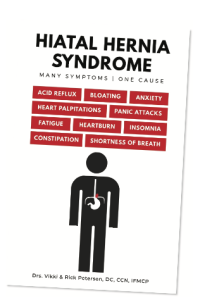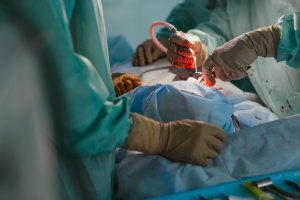Is Hiatal Hernia Surgery Worth It? A Video By Dr. Vikki Petersen – Video
Hiatal Hernia Surgery: Right for all Patients? Watch the Video
What you will learn about
The primary aim of hiatal hernia surgery is to restore proper anatomy of the stomach and esophagus.
However, I contend it is not really that effective in the treatment of hiatal hernia syndrome. Not only is this type of surgery risky, but it is also contra-indicated for patients with lung and heart problems.
Based on extensive clinical experience, I am a firm believer in a non-invasive, all-natural treatment of hiatal hernia.
In this video, I discuss why surgery is not the very best option for all patients, how surgery success rate is measured and why this is controversial, and how hiatal hernia surgery can actually fail people over the long term.
Transcript of the video
Hiatal Hernia Surgery: Now Frequently Recommended

In the book, when I talk about surgery for hiatal hernia, I speak about the fact that the results are poor. They’re not long lasting.
If most of your stomach is above your diaphragm and you can’t eat, then surgical intervention is a good thing because you’re not able to consume nutrients.
But, for someone with a small-to-medium hernia, talking about hiatal hernia surgery when the intervention has poor success doesn’t make sense. We really didn’t used to hear about that.
It used to be that a gastroenterologist either wouldn’t even mention that someone had a hiatal hernia, or if they did, it was sort of brushed off as well: “It’s small, it’s medium, no big deal. It’s not causing your symptoms.”
And I know, many of you are nodding who have been through this… As far as you know, if you’re having heart palpitations, or shortness of breath, or panic attacks, you’re told that this has absolutely nothing to do with your hiatal hernia — which is completely untrue.
But this change that we’ve been seeing as a team in the last year, is all of a sudden more patients are being sent to surgeons for consultations for their hiatal hernia.
And in the main, these patients have small hiatal hernias. It makes absolutely no sense.
Hiatal hernia surgery: not for everyone

The reason I wanted to mention it [in this video] today is because two days ago, I spoke to a mother with a 10-year-old. This young man is 10 and he has a small hiatal hernia, and they were actually sent to a surgeon who is recommending surgery on a 10-year-old.
This is really a dangerous precedent.
All I can think is that with the increased discussion of hiatal hernia, more people are wondering if they have it, they’re being educated, which is the whole point of this channel.
The whole point is to increase the knowledge of what this is, because so many are suffering from it, and they have no idea why they’re told “it’s all in their head”.
But getting back to this young man being recommended surgery, considering its poor outcome, it just doesn’t make any sense.
The only thing my team and I can come up with is more discussion and helping to contribute to it, so that there’s more awareness.
Patients are going to their gastroenterologist, asking “Do I have a hiatal hernia?”. And because they [gastroenterologists] don’t have any tools other than antacids, they’re resorting more to hiatal hernia surgery — which is scary.
Hiatal hernia surgery: missing the root cause
I just want to share this with you: do your due diligence on the outcomes of surgeries. Remember: a successful surgery just means that the procedure the surgeon tried to do, he/she successfully did. That doesn’t mean success in the way a patient would want success, meaning “this is never going to bother me again”.
Why is it that there’s such poor outcome for hiatal hernia surgery? Let’s look at that.
Remember that we’re talking small hiatal hernia: the opening has just expanded a little bit because the stomach is pushing up. The surgeon goes in there and sews that [opening] closed.
By the way — and it might not sound like a bad thing — when you have hiatal hernia surgery, you can never vomit again. Now, certainly not something fun to do, but if you ever really need to vomit (for instance, your body had food poisoning and it just says: “I want this outta here, I don’t want this to go through my digestive tract”), vomiting is a nice thing to be able to do occasionally.
This one young man, this 10-year-old I’m talking about, for various reasons, he vomited a lot. It’s something his body kind of regularly does as soon as he doesn’t feel comfortable. Imagine doing that to him and sewing this so tight that he literally could never vomit again as long as he lived it.
It can be a little scary if you really feel the need. It can be quite miserable. And we’ve spoken to patients who have gone through that.
More importantly, the fact is that the hiatal hernia surgery closed that widened opening. They’ve stitched that closed or tighter where it should be, so just the esophagus is passing through, and now the stomach is nicely below the diaphragm.
But remember: what’s the root cause? What caused that stomach to spasm and push up?
Getting in there and sewing that widened opening more narrow is not getting to the reason why the stomach is in spasm.
And guess what? Hiatal hernia surgery fail over time because that stomach spasms again… You didn’t get to the root cause of why, and it pushes up again. And guess what? It opens, it widens the opening again. Hiatal hernia surgery failed.
There is a natural approach

We do some things as part of our program. We relax the diaphragm and relax the stomach, and can get to the cause of why nutritionally, why the stomach was in spasm… Now, it’s not [anymore]. The body loves to heal.
So that widened opening starts doing exactly what it should. It is finding its home, going back to where it should be, because all that stress and irritation is relieved.
Hopefully you found this [discussion] interesting. If you know somebody who’s considering surgery, they really need to know the high percentage of failure. They really need to know about the whole vomiting thing… I know… Again, who wants to vomit?
But we’ve had several patients come to us post-surgery and talk about how miserable they are, and how none of their symptoms changed since their hiatal hernia surgery. No wonder! The surgeon didn’t get to the root cause of why they have a hiatal hernia.
If you are suffering potentially from a hiatal hernia or you know someone who does, please reach out. We are more than happy to offer a free consultation.
Just contact us through our website, and we do telemedicine in many states across the country. We have a clinic in Clearwater, Florida, and we can also do a teleconsultation over Zoom.
A holistic, multi-disciplinary approach
Root Cause Medical Clinic is known for approaching pathologies with one concern: finding the root cause of ill health or organ malfunction, to end the discomfort and inconvenience of poor health.
Together with you, we strive to identify the stressors of your body. Is it your lifestyle? Your diet? DO these stressors come from the malfunction of an organ or system (e.g. your nervous system)?
Stressors inhibit the capacity of your body to heal itself. There is always a root cause to hiatal hernia syndrome. We can’t just overlook it or say it doesn’t exist. We can’t automatically assume you need hiatal hernia surgery. We need to find the root cause to treat the condition effectively.
The members of our medical team all share the same philosophical approach to healthcare. We combine a long experience in functional medicine, nutrition and dietetics, physical therapy and chiropractic. This helps you heal faster.
Our medical clinic is located in downtown Clearwater, FL, at Ft Harrison Ave and Magnolia.
If consulting at our clinic is not convenient for you, we also offer telehealth medicine services. If you live in another state, please call us to see if we can serve you.
Additional resources:
Hiatal Hernia Syndrome: Why is it Misdiagnosed?
Book: Hiatal Hernia Syndrome, by Dr. Vikki Petersen
Post-surgical cardiac complications on hiatal hernia repair
Not everyone needs hiatal hernia surgery


